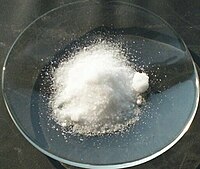
Photo from wikipedia
Worldwide, maize (Zea mays L.) is considered an important food and fodder crop. Compost as a soil amendment and potassium (K) could enhance the maize yield. Therefore, two field experiments… Click to show full abstract
Worldwide, maize (Zea mays L.) is considered an important food and fodder crop. Compost as a soil amendment and potassium (K) could enhance the maize yield. Therefore, two field experiments were carried out in the two seasons 2017 and 2018 to study the effects of compost at three levels and four forms of potassium fertilization on the yellow maize hybrid ‘Pioneer SC 30N11’ yield components. To conduct the field trials, a split plot system in three replications was established. Three compost levels (0, 5 and 10 ton/ha) were in the main plots, and four potassium forms (untreated, nano-potassium fertilizer, humic acid and potassium sulfate) were in the subplots. Plot size was 10.50 m2, with 5 ridges with 3 m length and 0.7 m width. The results indicated that the application of compost (as organic manure) and the potassium forms significantly affected the plant height, ear length, grains number/rows, grains number/ear, 100- grain weight, straw and biological yields, grain protein and K contents in both seasons. Increasing the compost from 5 to 10 ton/ha increased the yield, its components, protein and K contents. The foliar application of nano-potassium followed by humic acid increased all the studied characteristics. The interaction between compost manure (10 ton/ha) and nano-potassium (500 cm3/ha) or humic acid (10 ton/ha) recorded the highest mean values for all parameters during both harvest seasons.
Journal Title: Scientific Reports
Year Published: 2020
Link to full text (if available)
Share on Social Media: Sign Up to like & get
recommendations!